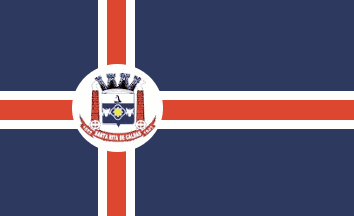 image by
Dirk Schönberger, 6 September 2010
image by
Dirk Schönberger, 6 September 2010Source: adapted from http://cid-57cc02038c003794.office.live.com/self.aspx/.Documents

Last modified: 2011-02-04 by ian macdonald
Keywords: minas gerais | santa rita de caldas |
Links: FOTW homepage |
search |
disclaimer and copyright |
write us |
mirrors
 image by
Dirk Schönberger, 6 September 2010
image by
Dirk Schönberger, 6 September 2010
Source:
adapted from
http://cid-57cc02038c003794.office.live.com/self.aspx/.Documents
An off-centred red cross, fimbriated white, on a dark blue field, a white disk on the cross bearing the municipal arms.
Official website at
http://www.santaritamg.com.br/. The flag was adapted from andregoth's data
at
http://cid-57cc02038c003794.office.live.com/self.aspx/.Documents.
Dirk Schönberger,
6 September 2010
The symbols are presented in great detail on the
municipal website (menus "Cultura",
"Simbolos Municipais").
The municipal symbols of Santa Rita de Caldas -
flag and coat of arms - are prescribed by Municipal Law No. 753, adopted on 4
October 1976. The symbols were selected in a public contest prescribed by
Municipal Law No. 705, adopted on 26 May 1976.
The municipal flag,
designed by the heraldist and vexillologist Arcinoé Antônio Peixoto de Faria, is
blue with a red cross fimbriated in white and the municipal coat of arms
placed on a white disk over the cross's arms. Taking
the width of the red cross as the size unit, the cross shall have a total
(red and white stripes) size of two units (that is, white-red-white with
proportions 1:2:1); the intersection of the arms shall be placed six units
from the flag's fly (that is, blue field-cross-blue field with proportions
1:1:2); the disk charged with the arms shall have a circumference of eight
units. In agreement with the rules of heraldry, the municipal flag shall have
the same proportions as the national flag, that is 14 x 20 units (7:10).
The flag follows the canons and rules of municipal vexillology, in agreement
with the traditions of the Portuguese heraldry, that is, a flag divided into
three, four, six or eight quarters, using as the main colour the color of the
field of the municipal coat of arms, and charged in the center or at fly with
a geometric figure enclosing the municipal coat of arms. Therefore, the
municipal flag of Santa Rita de Caldas is quartered, to recall the Christian
faith of the inhabitants of the town. The coat of arms placed on the flag
represents the municipal administration, while the white disk represents the
seat of the municipality. The disk / circle is the heraldic symbol of
eternity, being a geometric figure without either a beginning or an end; the
white color is a symbol of peace, friendship, work, prosperity, purity and
religious faith.
The cross represents the influence of the municipal
power over the whole municipal territory. Red is the symbol of commitment,
patriotism, audacity, intrepidity, courage and valiance. The blue quarters
represent the rural estates spread over the municipal territory. Blue is the
symbol of justice, nobleness, perseverance, zeal, loyalty, pleasure and
beauty.
The municipal coat of arms, also designed by Arcinoé Antônio
Peixoto de Faria, is made of a Samnite shield surmounted by a mural crown
argent with six towers argent port gules. The shield is azure a quatrefoil of
the same bordered argent charged with an eight-pointed star or flanked by two
oxen's heads argent, a chief argent charged with the portrait of St. Rita
proper. The shield is flanked by two chimneys gules with smoke argent,
standing each on a gear argent. The scroll gules placed below the shield is
charged with the writing argent 1852 / SANTA RITA DE CALDAS / 1943.
The Samnitic shield was the first style of shield introduced to Portugal by the
French influence; it was reused by the Brazilian heraldry to evoke the
colonization and building of the country. The mural crown with six towers
represents a town of third order, that is a municipal seat; the red ports
represent the values shared by the pioneers and the leaders of the community.
Azure is the symbol of justice, nobleness, perseverance, zeal, loyalty,
pleasure and beauty. The quatrefoil charged with the star or is the main
charge of the arms of the Carvalho family, recalling the founder of the town,
Antônio Martins de Carvalho. Or is a symbol of glory, splendor, wealth,
greatness and sovereignty. The oxen's head represent cattle-breeding, one of
the main sources of income in the municipality. St. Rita is the patron
saint of the town. The chimneys and gears recalls processing industry in the
municipality. Argent is the symbol of peace, friendship, work, prosperity,
purity and religious faith. The dates on the scroll recall the foundation of
the settlement (19 May 1852, when the Bishopric of São Paulo allowed the
building of a chapel dedicated to Santa Rita) and its erection as a
municipality (Law No. 1058 of 31 December 1943).
St. Rita of Cascia
(1381-1457; canonized on 24 May 1900) is an Italian Augustinian saint, aka
"The Saint of the Impossible"
http://www.newadvent.org/cathen/13064a.htm.
Ivan Sache, 11 September 2010